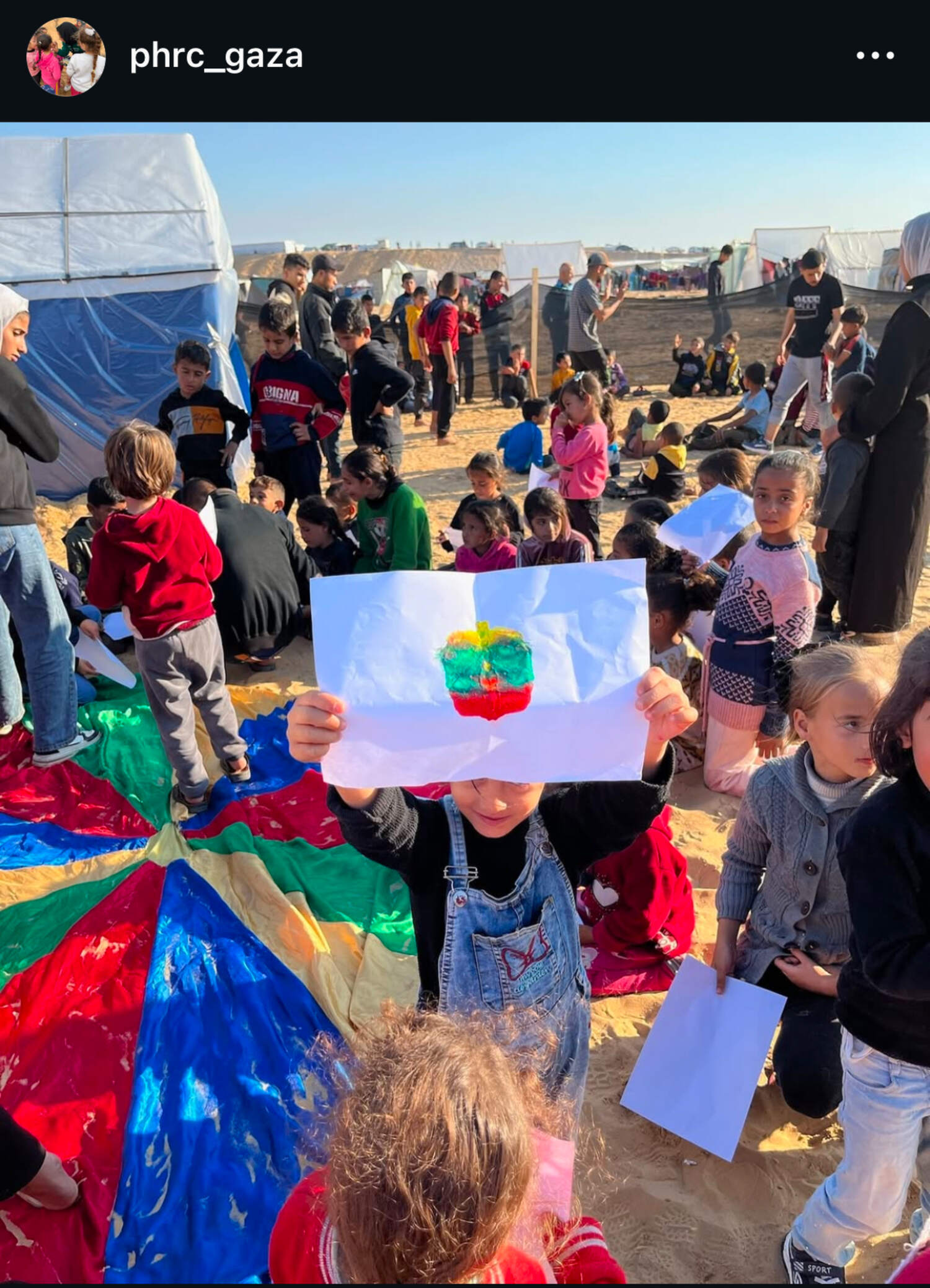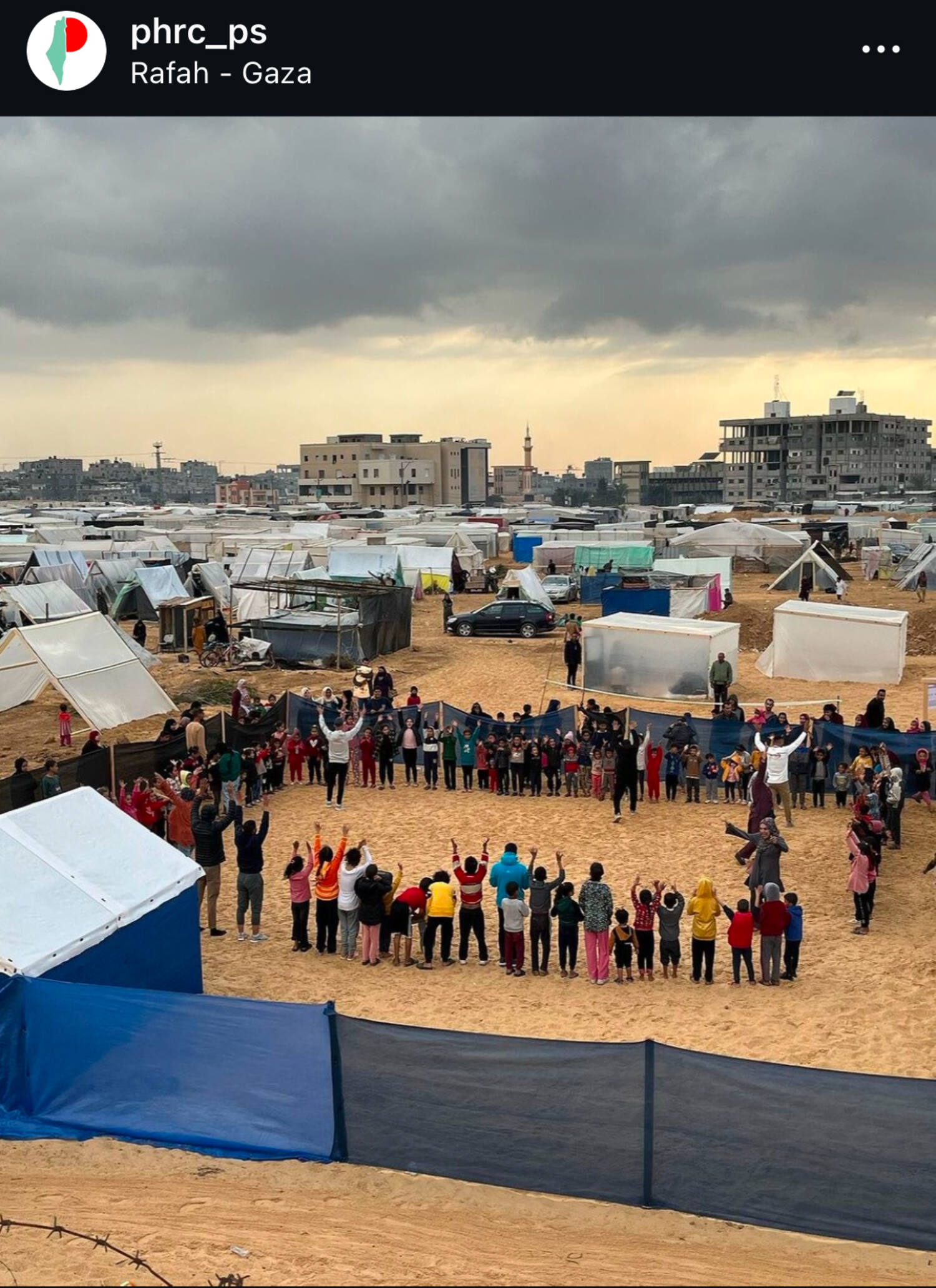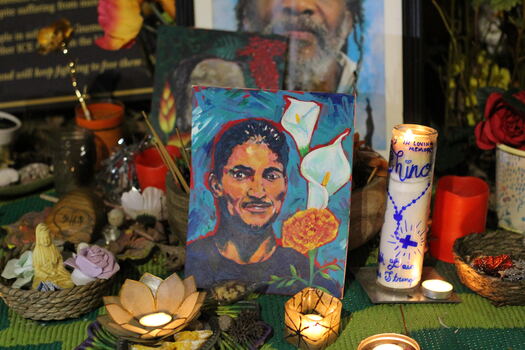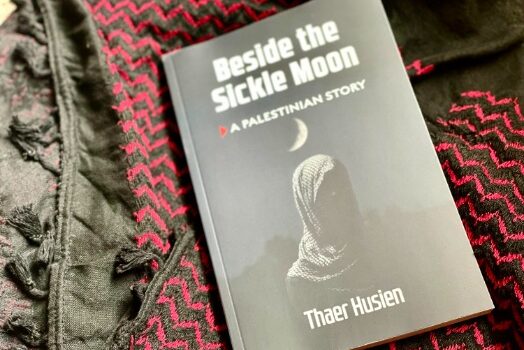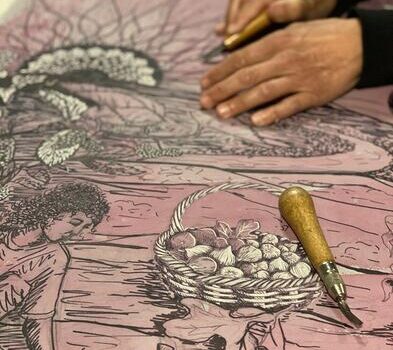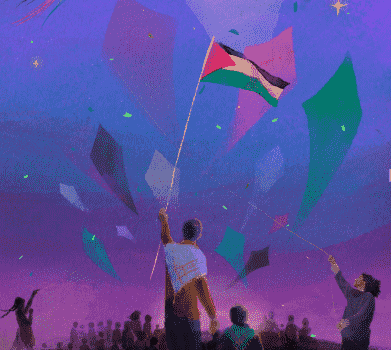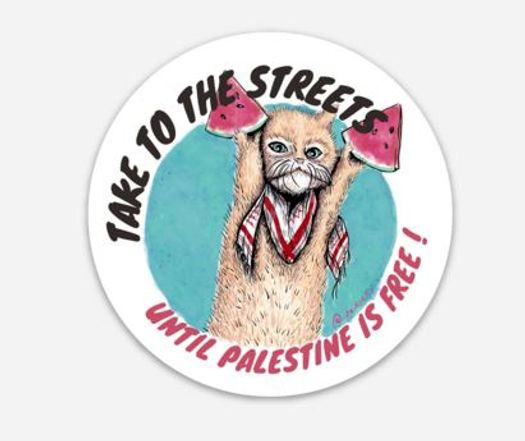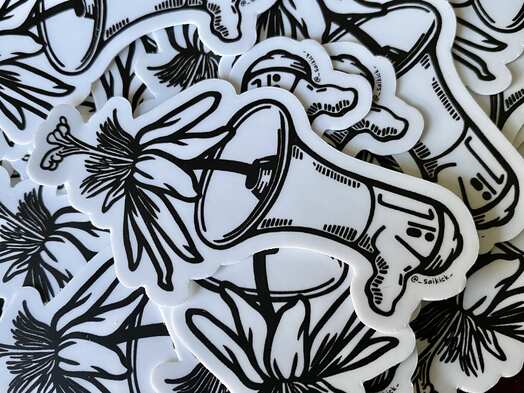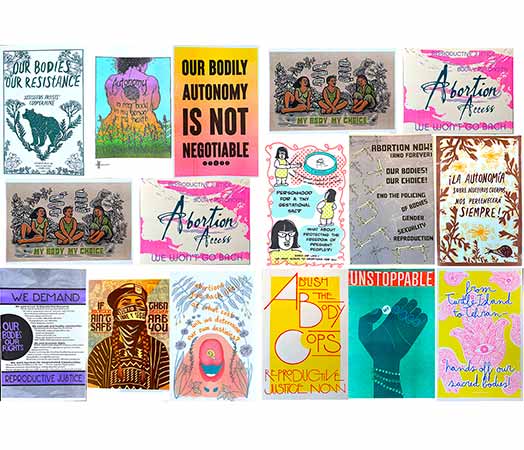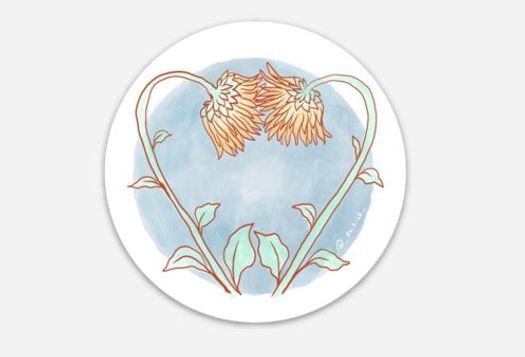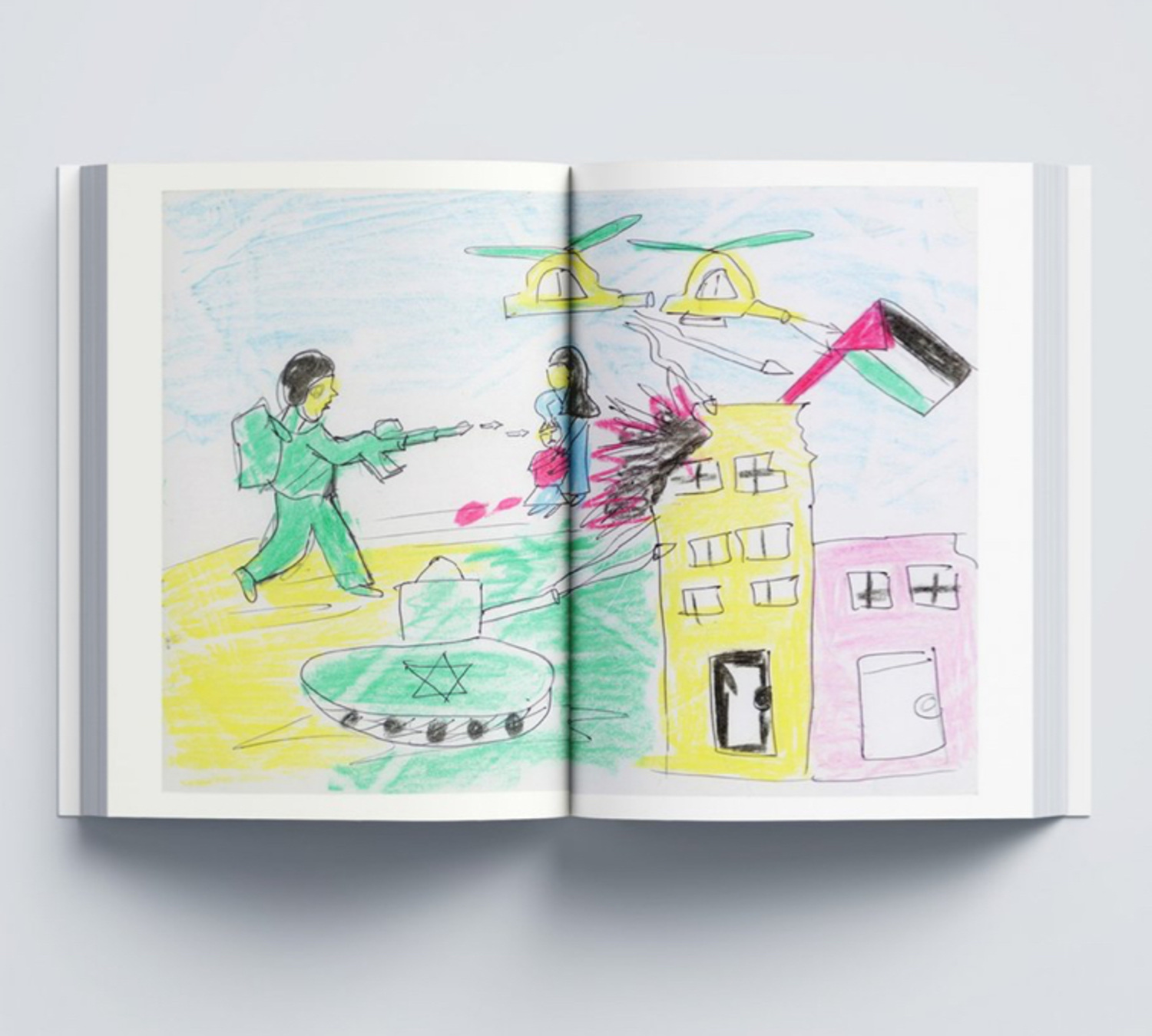
“When you carry this book, you feel the responsibility of ‘I have to act.'”
– Awni Farhat, founder of Palestinian Humanitarian Response Center
By November 2023 many of us were already starting to call the daily bombardment and campaign of violence by the Israeli occupation in Gaza, primarily funded by the U.S. government, a genocide. Day after day of immobilizing online updates, I was longing for ways to directly support efforts on the ground while searching for a glimmer of hope under increasing rubble and despair. I found such hope in posts about The Children’s Village, a place where Palestinian children were playing, singing, and making art. Their laughter overpowered the constant buzz of surveillance drones and the daily horrors of escalating targeted violence. The purest form of resistance against the Israeli occupation is Palestinian children’s joy.
The Palestinian Humanitarian Response Center (PHRC) was founded by Awni Farhat in November of 2023 to bring trauma relief activities and mental health support to children affected by the genocide in Gaza. In November of 2024, I joined PHRC’s “Witness Book Community,” a global network of community members eager to support the launch of the “Witness Book” campaign. Through our networks, we are amplifying the important work PHRC is doing on the ground in Gaza and Cairo as well as encouraging the purchase of the “Witness Book” by donations prior to the book’s publication in spring of 2025.
Please note this conversation with Awni Farhat took place in early January of 2025. Since then so much has and continues to happen: agreements of a so called “ceasefire” were reached; the great return of families to their homes in northern Gaza (much of which is completely destroyed); through prisoner exchanges, many Palestinian prisoners were returned to their loved ones after months, years and decades under torturous Israeli prison conditions; ceasefire agreements continue to be violated as food, water, medical aid and tents are not being allowed into the Gaza Strip; and the death counts still rise as more bodies are being excavated from the rubble to be properly buried. Daily violence by the Israeli occupation continues to escalate in Lebanon, Syria, and increasingly now in the rest of Palestine with threats of mass forced displacement and further ethnic cleansing of the Palestinian people by the new Trump administration.
Many of us have seen more violence than we can put into words on our social media imposed onto the Palestinian people, paid for by our tax dollars, all the while the international community is still incapable of holding the Israel government and military accountable to their ongoing war crimes. Yet the daily photos and videos compare to nothing Palestinians on the ground have and continue to experience.
Awni Farhat is an example of one person who dropped everything he was doing to support his people. He has created a network of artists and healers for many Palestinian children through the PHRC. Amidst difficulties of distant time zones, surmountable grief, and opening a new PHRC center in Cairo, I am grateful Awni was willing and able to take the time to speak with me about PHRC’s critical work as we attempt to support the next generation of Palestinians now and into the future.
Saiyare: Would you please tell me a bit about yourself, and how you ended up starting the Palestinian Humanitarian Response Center?
Awni: Myself is not important. I’m someone who’s doing this work to contribute to the collective. I think that what matters the most is that we need to act with the feeling that we are one part of the whole, the whole community. What is problematic is that we are not acting as a collective, everyone is acting as an individual, and everyone is seeking individual gains. We are repeating the same mistakes all over again. What’s happening in Gaza now is not something new. It’s not something that just occurred in the last 15 months. It has been there since I have known life.
Awni was born and raised in the Jabalia Refugee Camp in Gaza, Palestine. Since 2011 he has worked with several international and local Palestinian human rights organizations serving children.
Awni: I also go to Gaza and I have family in Gaza, my mom and dad and everyone I know, everyone I love. My childhood was in Gaza. We have a responsibility to act, we have the responsibility to be there for our families.
When the genocide started, Awni was living and working in the Hague, Netherlands. He could not continue to endure witnessing what was happening and left for Cairo. He started mobilizing different organizations there who were supporting Palestinians in Gaza, particularly with medical supplies for hospitals.
Awni: I went to Gaza myself in November [of 2023] during the “truce’. I managed to get in, and I stayed there. I have experienced war in 2014, 2012, 2008-09, two Intifadas and systematic violence. This has been all our childhood.
I was born during the first Intifada in Gaza. We have seen many, many life-threatening situations. We know how it smells. We know how it sounds. We know how it feels. Yet, even with my experiences, I have never been exposed to something like this. We didn’t imagine that it would reach this level. It was an evil level of massive destruction, massive displacement that I have never seen before. You go to a place and you see thousands of tents. This scene is new to our eyes. You see children running around without shoes.
Awni then tells me about a time he was in a car that just missed a house bombing by 500 meters. Him and those inside the vehicle were very lucky the car was not punctured and that they are still alive. “It’s like you are between life and death,” he said.
Inspired by his nine nieces and nephews, Awni decided to strive for building bigger family support systems in the displacement camps. He recognized parents were exhausted and busy attempting to secure food, water and necessary supplies for survival. It was clear parents did not have the mental capacity to care for their own kids. Children were being left alone to care for each other and take in all of the horrifying experiences around them. Awni believes that children need play and physical activity, to stimulate their brain in order to grow and combat the suppression caused by trauma they have experienced. Through his networks The Children’s Village was created where psychologists, artists, circus people and musicians would rotate programming at various corners of the village. Children could be there for four hours or sometimes stay all day. The children and their adults were protected by the PHRC.
Saiyare: Can you explain what you mean by “protected”?
Awni: The children and their families are protected by our organization in the sense that we are creating a support system. So, protection does not, of course, mean safety. We can’t protect people in this way. But they were not left in the street. The majority of Palestinians in Gaza who had a job, have lost it. If you have a restaurant, you have lost it. If you have any source of livelihood, it’s just damaged. So to have a source of income is something that makes you feel a bit secure or protected.
For one year, we have supported families by providing diapers or milk or whatever families needed. They come to us for support and assistance. We didn’t only create space for children to play. It goes deeper than what people see.
I’m proud to say that we are the first organization to start this and not to do one-time intervention. This is the difference between us and others: They go with a group, they go to a place, and they do the intervention, and leave. But for us, it was an organized, structured program. It’s hard work.
Saiyare: You’re trying to sustain those relationships.
Awni: Yes, to stay in relationships, to build trust, to create a community, to also monitor the impact and progress of these children, and to create a reason for these children to carry on. And every child, of course, has had a different experience. Some lost family members, some have seen dead bodies in the street, some were evacuated or been forcefully displaced from the north to the south. And they’ve seen soldiers and seen people carrying guns. Seen tanks. They’ve seen fences. They’ve seen their homes being burned. Every child has had a different experience, and it’s quite delicate to work with these cases. So that’s why we have psychologists.
With just twenty people, PHRC was working with more than 200 children a day. After over a year of this work, PHRC is refocusing on a selected, smaller group of families in Gaza and Cairo, with full signed consent of the parents to take photos and conduct family visits. They are also in contact with mentors of the children in case any needs must be met. PHRC will focus primarily on trauma and mental health support while still utilizing the same outlets of art, theater, play, movement, creative writing and journaling. They feel the crucial responsibility to do the delicate work of creating a space for children to process their emotions. Awni explained, “You can’t, for example, ask a child to draw a drawing about his uncle being murdered. And they will draw blood, and they will draw tanks. And you don’t create space for these children to be safe as well. To talk about it, to process it, to guide them through this pain and this grieving process. You can’t open up an injury and not treat it.”
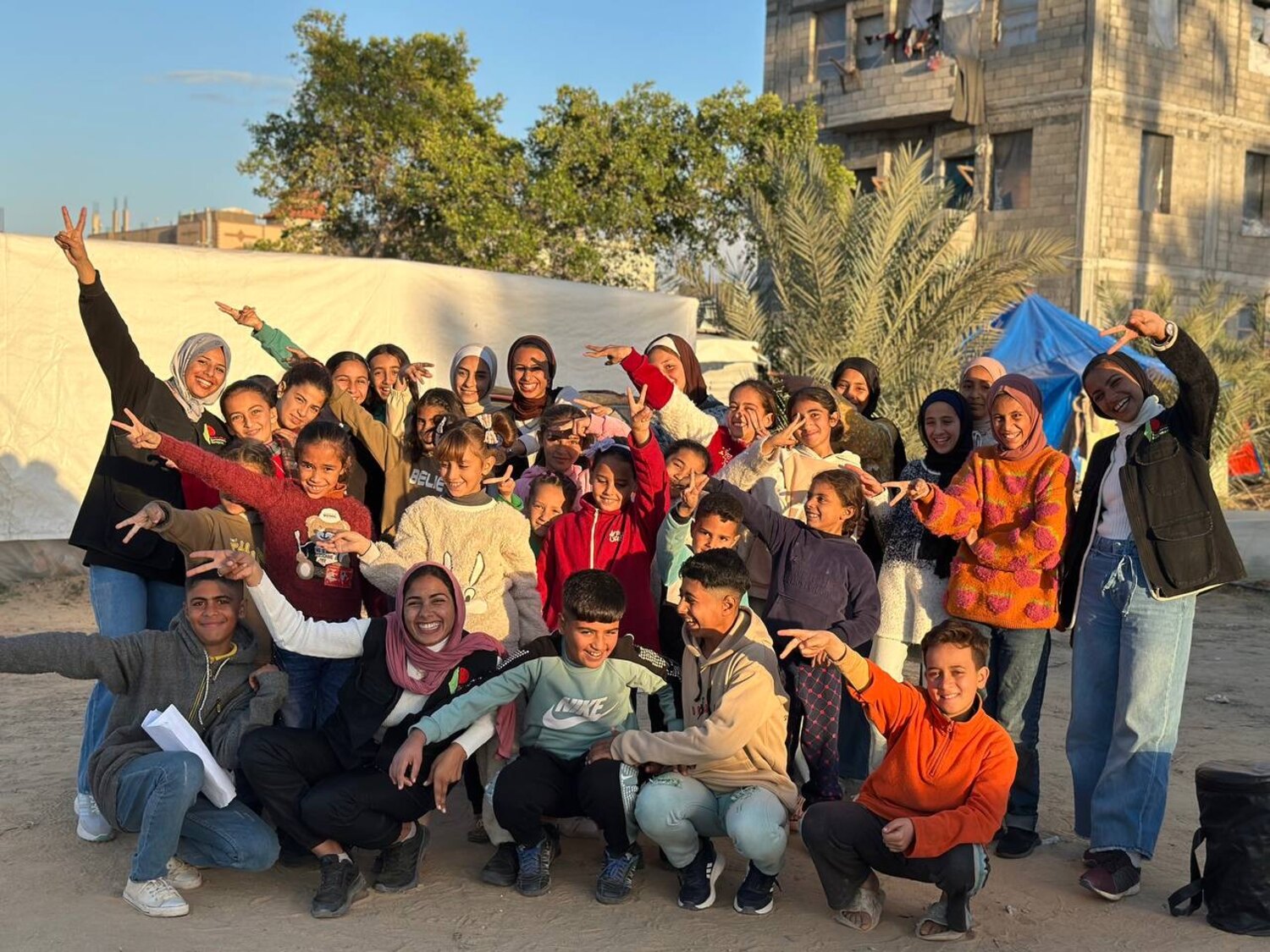
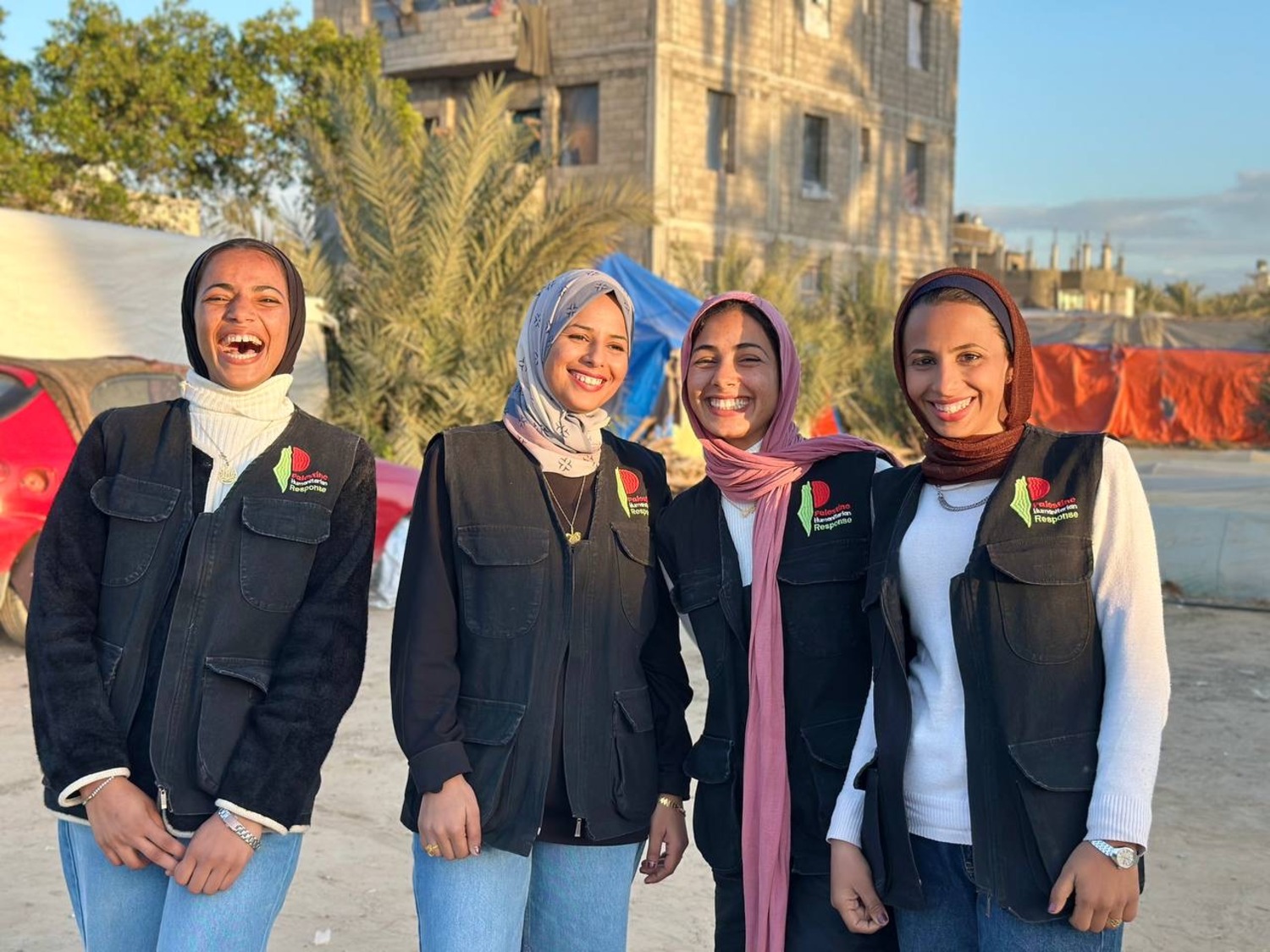
Awni: With children, we’re taking a more thoughtful, more in-depth approach. We aim to help a small group of children and we make a serious, positive impact.
“We are trying to create a hug for these kids and just walk with them together towards a future within this damaged reality, because we need to create a future. We need to create a hopeful future for these kids.” – Awni Farhat
We’re gonna help children to laugh. We’re gonna help children to have a good time. We are trying to create a hug for these kids and just walk with them together towards a future within this damaged reality, because we need to create a future. We need to create a hopeful future for these kids. That’s very important.
Israel is trying every day to destroy these children, to destroy the hope of and for these children intentionally. It’s structured violence against these children, and what we do is try to save as much as we can, try to build as much as we can, try to create foundations for hope for some of these children. We can’t work with a mass number of children, maybe one day when the organization becomes bigger. But also it’s a huge responsibility. We can work on the micro level and try to save a group of these children. That’s an achievement on its own if we manage to do that.
Saiyare: Definitely. Is this a good moment to start talking about the “Witness Book”? It sounds like from the little I know, that the “Witness Book” is planning to come out in April of 2025, and there’s a compilation of children’s testimonies, writings, drawings from over the last year. Would you be able to describe it a little bit more and what is your hope with this publication?
Awni: The book is not going to only show the reality of children during last year. It’s gonna go beyond that. It will show the reality of children for as long as this colonial reality has existed. We always need to contextualize it, to bring it back to the root causes of this problem and also to understand- including myself, even as someone who’s been working on this issue was once a child exposed to heavy trauma and to this same structural violence. My whole life started in this, so you can’t just deal with this issue only from what we see now, we need to also link it and connect it to the wider, historical context.
The “Witness Book” brings together these stories, these drawings, these collections of testimonies, collections of analysis, collections of reality. When you open this book, you see a reality of a completely different life that you can’t even imagine, that is not physically close to you. This book is a physical, living proof, close to your face, close to your eyes. You can see it. You can witness it. You can go through these pages and understand what’s happening thousands of miles away, and why it’s happening and who’s allowing it to happen.
For me, children are very honest. They draw, they put on paper what they see and what they witness. I think, with their brushes and their pencils, children take you into their own experience. Very simple, very honest, very straightforward. There’s not a lot of big words. There’s no big political statements. It’s just a child drawing a few lines. And just this sends a message. I think that if you have your eyes open, you will see it. You will feel it. You will understand. You can relate to a child’s drawing much better than seeing a video on Instagram of people being cut into pieces. And this is what we have been seeing for the last year. But people can’t relate to that. They can’t even comprehend what they see. They can’t even understand this (like a horror movie) because this doesn’t feel real, doesn’t look real. So your response will be complete denial or complete withdrawal from this. I know a lot of people who closed their Instagram accounts because they didn’t want to see this. They just completely withdrew from this reality. It’s very cowardly, but they just don’t know what to do with themselves. They don’t know how to confront themselves with this. They don’t know how to deal with it.
“And that’s how I look at our children, as though they are the seeds of the world, and they are all connected because everyone can leave an impact.” – Awni Farhat
We want to use this book as a tool to make people realize the huge impact that Israel has left on Palestinian children, and not only on these children, because our children are also connected to the world. They are not isolated from the rest of the children. They are part of the whole circle as one tree that has roots on the ground. It’s not one tree. It’s part of the whole planet. And that’s how I look at our children, as though they are the seeds of the world, and they are all connected because everyone can leave an impact. I was a child in Gaza. Now I’m speaking to you, and I, of course, I don’t know where you grew up, but, at some point, we will all influence each other. We have to pay attention to this. It’s a cycle. One day you will breathe the same air that I breathe. And this will be mentioned in the book.
“Witness Book” is a preservation of historical moments and memory from children PHRC has worked with in Gaza. Israel is doing everything to destroy any proof of Palestinian existence by not only the massacres of civilians but historical and cultural buildings, hospitals, libraries and universities have been decimated.
“[‘Witness Book’] It’s a way to also give voices for these children, to give recognition to these children, to give dignity to these children, so that their stories are not forgotten. Their stories are not just another news or media cover. They matter.” – Awni Farhat
Awni: [“Witness Book”] It’s a way to also give voices for these children, to give recognition to these children, to give dignity to these children, so that their stories are not forgotten. Their stories are not just another news or media cover. They matter.
Saiyare: Like a way of honoring their story and experiences?
Awni: Yes, it’s a way of honoring their experiences. This is what we’re trying to do with the “Witness Book.” At the same time, we have an exhibition that travels. Now it’s on hold, but it will travel with the book as well, so that people also can see it and can see the drawings, can learn more about Palestinian children’s stories, and they can come close them. We have the original drawings so they can come close to these drawings as much as they can, and they can feel it. And I think that’s very important so you can all be confronted with it.
You go home and you think about it. You think about, “Why did a child draw this?”
And hopefully, it will help you to understand the answers better.
Saiyare: Thank you. For more of the fundraising campaign side for the “Witness Book.” What are some of your fundraising goals? Is there a certain amount that’s still left to fund to complete the rest of the publishing and printing?
Awni: I don’t think more than 200 people now [have donated to the campaign]. I can say now I think we should be able to print it. It’s an open call for people. We’re not going to close this campaign. That’s the reason why we put on our website because we want to keep it open. There’s no goal to reach. The goal is that everyone should buy this book. The cost of printing a book is really high. The book sales will then support our projects.
We are basically doing it for people to really have this book. It’s not like we are making money or making profit out of this. It’s not really a fundraiser. We’re asking people to buy the book for them to have the book. And that’s the main goal: we want people to share it with their network and to just talk about it. This will help us to amplify the voices of Palestinian children, and to, as you say,honor the experiences.
Saiyare: Is there anything else that you want people to know or what you hope that the publication will move them to act in a certain way after reading the “Witness Book”?
Awni: [“Witness Book”] You buy it, you know it’s a call to action. When you carry this book, you feel the responsibility of “I have to act.” Action is not going to a protest. Action is disruption. Action is a way to shake people’s minds and existence to realize that we can’t leave these children alone. We can’t leave these children to suffer alone. We have to act. We have to take full responsibility for our existence, and to look at them as our own.
I think if this changes, then I think we, the world, would be a better place. And to stop being selfish and individual, and to really look at the human side of all these children. And to not look at them from the lenses of politics, or religion, or ideologies, or color.
“And what we’re trying to do with the book is to show the world that we are more human than anything you know. The humanity of Palestinians is much bigger than our pain.” – Awni Farhat
Israel has managed to dehumanize our children, to dehumanize our narrative and to dehumanize our story. And what we’re trying to do with the book is to show the world that we are more human than anything you know. The humanity of Palestinians is much bigger than our pain. The more pain you experience in life, the more human you’ve become, I think.
Saiyare: Yeah, I think from everything that I’ve witnessed, I think Palestinians have definitely been proof of the possibility of humanity in the ways that you see people showing up for each other and caring for each other. Amidst all of the harm and violence, I think it is a very clear example of how our society should be operating instead of trying to protect who we think are our own. For example, this past weekend, I spent some time with friends who are visiting, and they are one and a half years old. We all took turns, all eight of us, looking after them and making sure that they were cared for. And you know not everyone has that experience to know what it’s like for a community to care for these little ones who don’t know what is happening around them.
I think it’s a beautiful project that all of you are working on to further humanize Palestinian people and Palestinian children who don’t have a lot of choice in what is happening to them. I’m glad there are those of you on the ground, working in different capacities to ensure that they’re being seen, heard, and loved.
Donate to preorder “Witness Book” at https://www.palestinehumanitarianresponse.com/book-witness. €60+ gets your name in the book and will get you a copy of the book, €45 will get you a copy of the book, and €20 will get you a pack of postcards with images of the book. You can follow them online at Instagram at @phrc_ps, @phrc_gaza and share the work of PHRC at https://www.palestinehumanitarianresponse.com/. This conversation took place over Zoom on January 4th, 2025. The content of the conversation and photos are being shared with Awni’s permission. Any other errors are Saiyare’s alone.
(UPDATE as of February 24th: The Witness Book campaign has reached their initial printing goal and the campaign is currently closed on the website until the second round of printing becomes available. We appreciate your patience! In the meantime, you can continue to support PHRC directly to continue funding their programs.)
